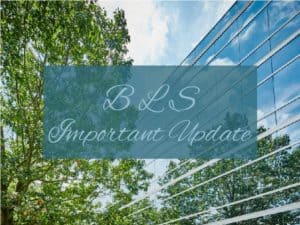August 6, 2020
In an effort to provide guidance to companies and nonprofits that received a Payroll Protection Program (PPP) Loan, the Small Business Administration published Frequently Asked Questions related to PPP Loan Forgiveness. The guidance provided is lengthy and questions still remain. To help give a summary of what you need to know now, the BLS Team has outlined some of the highlights below.
FAQ Highlights:
- Previous guidance implied the forgiveness for owner-employees would be capped at $15,385 or $20,833 (8-week vs 24-week covered period), which was thought to apply to cash compensation and health and retirement benefits. Depending on your entity type, the new guidance clarifies this issue:
- C-Corporation – Health insurance payments made on behalf of owner-employees are not subject to any limitation if paid or incurred during the covered period. Retirement benefits paid on behalf of owner-employees are limited to 2.5/12 of the 2019 employer retirement contribution (assuming 8/52 for 8 week covered period). State and local taxes paid or incurred during the covered period on behalf of any owner-employee would be allowed without any limitation.
- S-Corporation – Health insurance payments made on behalf of owner-employees are not allowed as they already should be included in the owner’s W-2 wages, which would be subject to the $15,385 or $20,833 limit. Retirement benefits paid on behalf of owner-employees are limited to 2.5/12 of the 2019 employer contribution. (assuming 8/52 for 8 week covered period). State and local taxes paid or incurred during the covered period on behalf of any owner-employee would be allowed without any limitation.
- Schedule C – Health insurance, retirement payments, and state and unemployment taxes paid on behalf of owners would NOT be eligible for forgiveness. The capped amount would be based on 8/52 or 2.5/12 of 2019 net profit as reported on line 31 of Schedule C.
- General Partners – Health insurance, retirement payments, and state and unemployment taxes paid on behalf of owners would NOT be eligible for forgiveness. The capped amount would be based on .9235 of net profit as reported on Schedule SE, capped by the 8/52 or 2.5/12 limitation.
- Previous guidance implied that prepayments of costs (i.e. prepaid rent) during the covered period but incurred after the covered period could count in the forgiveness calculation. The guidance makes it clear that accelerated payments for health and retirement contributions are not allowed if incurred after the covered period.
- Previous guidance for covered utility payments did not define transportation costs. The updated guidance defines transportation costs as utility fees assessed by state and local governments. Payment of these fees by the borrower is eligible for loan forgiveness, however, normal auto transportation costs incurred in the normal course of business are NOT eligible.
BLS will continue to send important updates as information becomes available. Please be sure to visit our COVID-19 Resource Center for additional details and past communications. Reach out to your BLS Team Member or email us at info@belfint.com with any questions.
We are here for you!
Your BLS Team
